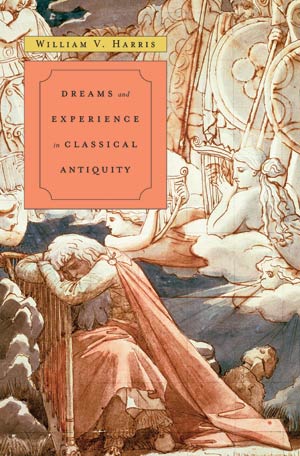
From the Iliad onwards, via Aristophanes and the gospel of Matthew, to Augustine and beyond, Greek and Latin texts in many genres are constellated with dream-descriptions. The best ancient minds, Plato, Aristotle and Galen among others, paid careful attention to what dreams might mean. Yet no work in English (and only one in any other language) attempts to establish how the Greeks and Romans understood their dreams. In Dreams and Experience in Classical Antiquity, I make cultural history out of this material, with the help of contemporary post-Freudian science.
I contrast Greek and Roman ways of understanding dreams with those that prevail in the modern west, while contradicting the opinion that the Greeks and Romans in general treated their dreams superstitiously and credulously (sometimes they did, just as people do now).
I start with “epiphany” dreams, a type of dream still sometimes described in unmodernized societies: these are dreams consisting of “appearances” by authority figures who give orders or impart information. I explore the psychological, religious and literary reasons why this form of dream-description was so popular, trace its continuance through the Middle Ages and attempt to explain why it has virtually died out.
Did ancient people really dream like that? This question leads to another: can we ever know what any ancient person really dreamt? A number of extraordinary individuals feature in this discussion, including Saint Perpetua and the emperor Constantine. But the person who comes out of the investigation best is the hypochondriac second-century AD rhetorician Aelius Aristides, author of what is in effect antiquity’s only surviving dream diary.
Did the Greeks and Romans then believe in their dreams? What that might mean, and how Greeks and Romans of different classes and periods differed on this subject, are questions that require a careful analysis. In the book, this ranges from the relative credulity of Artemidorus of Daldis, the author of Graeco-Roman antiquity’s only surviving dream-book, to the lucid scepticism of Cicero. This is mainly an investigation of ordinary people; my last chapter by contrast assesses Greek and Roman attempts to understand dreams naturalistically. In other words the chapter is about the efforts of philosophers and physicians, some of whom – most notably Aristotle – made a large number of perceptive statements about a phenomenon, which as far as dream-content is concerned, still remains mysterious.
“What fits least well with common assumptions about the Greeks and Romans is the clear-eyed rationality of certain among them.”
We do not know why we dream, or what if anything our dreams may mean – though some theories are much more plausible than others. In these circumstances it is worth considering what other highly articulate cultures have had to say on the subject, and especially what our intellectual ancestors among the Greeks and Romans had to say.
All the more so because it is hard to resist the notion that dreams reflect, in some way, our “real” thoughts or “real” personalities. This idea has ancient roots – though it was not the general belief of the Greeks or Romans.
What is in fact most extraordinary about ancient ideas about dreams is ancient skepticism. What fits least well with common assumptions about the Greeks and Romans is the clear-eyed rationality of certain among them.
Hence the study of ancient dreams offers a window into the development of ancient religious thought, including early Christianity.
It also offers a window into the development of ancient science, or, as some might like to say, “proto-science.”
The historiographical challenge here is pluridisciplinarity. One kind of history-writing that is, in my opinion, destined to grow in importance requires not only some use of social sciences (in this case anthropology) but, more importantly still, some use of natural sciences (in this case psychology). Without considering exact scientific descriptions of the phenomenon of dreaming, it would have been impossible to reach a balanced conclusion about the credibility of ancient dream-reports.
From my point of view, this study continues the sort of historical-psychological investigation that I undertook in Restraining Rage: The Ideology of Anger Control in Classical Antiquity. Indeed, rage was an important part of the psychological landscape of antiquity.
In truth, the best place to start is the beginning. The book is carefully structured and non-repetitive, so it is best to read the Introduction first, and keep going. Whether the dream-sending spell on page 1 works, I leave to readers to discover.
The next-best place to begin a non-fiction book is often the index. In this case the index starts with Abraham and ends with Zulus. On the way the index-reader will meet plenty of expectable items – anxiety dreams, Freud, Homer – and some possibly less expected ones – Chartres, demons, Scipio Africanus.
You will find in this book hardly any descriptions of my dreams, mainly because other people’s dream descriptions easily become tedious. But I have sometimes kept a dream diary – a narcissistic habit, and also in my opinion a waste of time, unless you are writing a book about dreaming.
As for where to dip into the book, it depends who you are: if you know psychology, I guess that I probably want you to read the chapter about naturalistic explanations of dreaming offered by the Greeks and Romans. And let me know what you think.
If you know the classics, it might be good to start with the most “scientific” chapter, which (aside from the Introduction) is Chapter 2. If you are simply interested in dreaming, you might start with the epiphany dreams (Chapter 1). If you want to read some bizarre dream-descriptions, try for example page 50 or page 97 or 111 – in fact there are a few more.
“I have sometimes kept a dream diary – a narcissistic habit, and also in my opinion a waste of time, unless you are writing a book about dreaming.”
I am looking forward to some debate, since some readers will certainly not agree with my conclusions.
It would also be wonderful if this book somehow managed to get people to cross the divide that separates psychologists from historians and social scientists. I am not optimistic about that, even now when it is so easy for a reader to explore in fields adjacent to the ones that s/he knows about. But, as I have implied already, I hope Dreams and Experience in Classical Antiquity is a symptom of a spreading willingness on the part of historians to study human psychology in a systematic fashion.


William Harris got his dream job, teaching Greek and Roman history at Columbia, at age twenty-six, and has been there ever since, apart from more or less prolonged absences in Oxford and in Italy. He is Shepherd Professor of History and also Director of the Center for the Ancient Mediterranean. His awards include a Guggenheim Fellowship and a Mellon Foundation Distinguished Achievement Award (2008-2011). His next book is provisionally entitled Rome’s Imperial Economy.